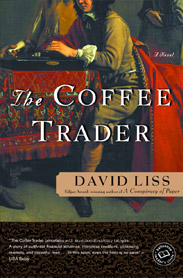Title: The Coffee Trader
Author: David Liss
Year: 2003
Genre: Fiction
Rating: 3
Admit it, we all drink a little too much coffee. We're all pretty well acquainted with that niggling headache around 2 o'clock if you'd made it that long without a cup, and most of us at one point or another have used it to cure a nasty hangover. Besides the TV and the microwave, the coffeemaker is a staple of the American home.
David Liss's fast-paced conspiracy novel centers around the induction of coffee into European culture as "the drink of commerce." The book reads like a long night with a little too much caffeine- always interesting, but sometimes it would be better to just go back to bed. The cast of characters is colorful and well-developed, but the whole story just tries a bit too hard.
The story opens on Amsterdam in 1659, the amazingly tolerant center of capitalism and the site of the Exchange. Our protagonist, Miguel Lienzo, is a Portuguese immigrant and a Converso-- a Secret Jew, one who outwardly professes Catholicism and keeps his faith in private. He joins in business with a crafty widow named Geertruid Damhuis in a complex plot to make an enormous fortune from imported coffee. As the book progresses, we meet Miguel's neurotic brother Daniel, and discover his wife Hannah is infatuated with Miguel. A complicated web of characters, including the annoyingly peripheral Alonzo Alferonda, try to ruin Miguel's plans as the book progresses and every situation tries to frustrate his fortune-to-be.
Miguel Lienzo is an extremely well-developed character. We spend most of the book following him through his various debts, threats, and exchanges, cheering him on and learning more of who he is each time he interacts with someone. By the end of the book, we become so attached to him that we can hardly see what he's become, which is deliciously conflicting (and the only plot twist that affected me, honestly). Where many writers try too hard to give their characters foibles and faults, Miguel fills himself out into a full human being, and we become attached to him almost immediately, when he petulantly comments to Geertruid that coffee looks like "the devil's piss."
The Coffee Trader begins brilliantly, describing the colorful and often underrated Dutch capital in the lurching era between the Renaissance and the Enlightenment. We soon learn how wonderful a haven Amsterdam is for the Jews-- with no fear of the Inquisition, they can keep their faith to themselves but not fear constant uprooting and death. However, we also learn to be nervous of the power of the Ma'amad, their council of Portuguese Jews, and its crafty politics. Liss presents us with a world that begs to be further explored, from the wild trades on the Exchange to the grimy alleys near the canals.
Although Liss is a talented writer, he disappoints in the overall tidiness of this story. It is a conspiracy book, fast-paced and convoluted, but there are just one too many plot twists-- it becomes hard to see how the beginning unites with the end, and the characters resemble something like debris caught up in a twister. We can just keep track of all the complicated names (like Annetje, Joachim, Alferonda, or Crispjin) when Liss throws another betrayal at us, sending our opinion of that character spinning out of control. The trouble with betrayals is that we have to be attached to the character before it really affects us-- and with so many names and personalities to remember, each one becomes more expected and less upsetting.
The whole book is well-written, the language displaying Liss's easy command over the world of literature. The perspectives alternate between Miguel, Alferonda, and Hannah, giving us a full perspective on the wild world of capitalism and brutal trade. However, Alferonda disappoints for being such a central character to the work. His chapters are annoyingly self-centered, which makes the case that he is a narcissist and helps to develop his character, but does a poor job of placing him in the story. I understand Liss wanting to keep the secrets until the end of the book, but it might have been better to either leave out his "memoirs" entirely or give a little more context into the entire of the book.
Nevertheless, The Coffee Trader is a good read. At 384 pages in the hardback, it's a decent-length read, just enough to make people in Starbucks think that you're clever and deter them from interrupting you. (It becomes a far more interesting read when you have a huge mug of coffee in hand.) The historical context is well researched, and opens the historical-fiction regulars outside of the traditional box of European novels about the 17th century. It's not often that you come across a book that focuses so well on trade in a sphere outside of England or France. Here's to hoping that The Coffee Trader won't be the only one about the subject.
I got my copy of The Coffee Trader from my library, so yours should have it too. If not, you can get it on the Kindle store for $12.00, or buy it in paperback on Amazon for as low as $5.35. You can't go wrong with that price, and getting to know David Liss as an author is no mistake.

No comments:
Post a Comment